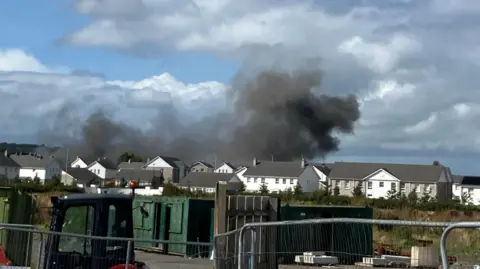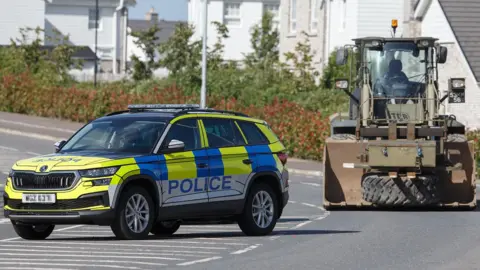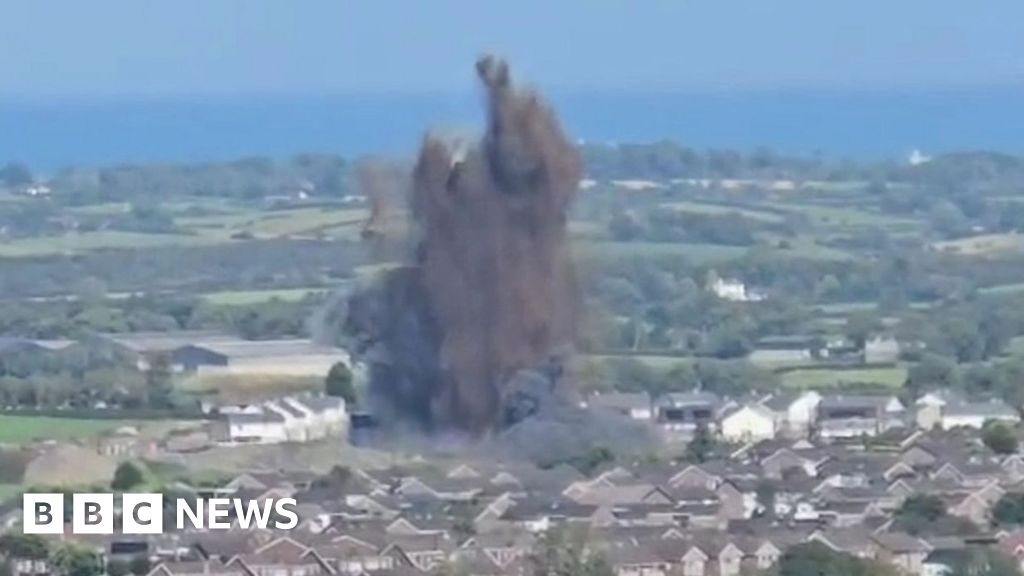Residents have been returning to their homes following the controlled explosion of a World War Two bomb in Newtownards, County Down.
The 500kg (1,100lb) air-dropped SC-500 German bomb was found at a building site at the Rivenwood housing development last Thursday.
Four hundred nearby homes were evacuated on Saturday with residents told they could be out of their homes for five days.
Military experts had worked to reduce any damage from dealing with the bomb by constructing a sand-filled structure around it.

Catherine Fleming, her husband and 16-month-old baby Luca were relieved to be getting back into their home, which was round the corner from the site of the controlled explosion.
They had just returned from holiday on Saturday when a police officer called to their door, advising them to evacuate the property.
The family and their three dogs had to stay with Catherine’s parents, which was a tight squeeze.
“It was a full house but we managed fine, it was grand,” she said.
Unloading duvets and other belongings out of the boot of their car, Catherine told BBC News NI she couldn’t wait to spend a night back in her own home.
“The house is okay, there was a wee bit of dust but nothing that wasn’t easily cleaned up.
“We’re just getting in, getting the dinner on, getting [my son] to bed… Getting a rest will be lovely.”

Stephanie McFee, who was evacuated from her property on Sunday morning, told BBC’s Evening Extra programme that it would “be amazing to get home”.
“I cannot tell you how happy I am,” she said. “It’s been stressful but the services have done an amazing job by what it seems, so hats off to them.”
Ms McFee said she understood there had been no major damage, adding she had been worried about the condition of her property and whether or not her insurance would cover it.
“It’ll be great to see it and see everything standing,” she said, adding that she was keen to inspect the property herself.
This is the approach encouraged by Ards and North Down Borough Council, which has issued information for residents returning to their homes.
“It is the homeowner’s responsibility to check the condition of their property,” the document states.
‘Highly complex operation’

The controlled explosion took place at about 15:38 BST, police said.
“The munition found, which I can now confirm was identified as being an air-dropped SC-500 German bomb from World War Two, was understood to have been in and around 83-years-old, but still posed a significant risk to public safety, even after all this time,” Supt Johnston McDowell said.
Belfast and its surroundings were heavily bombed by Germany in 1941.
World War Two munitions are found across Northern Ireland from time to time, but they rarely cause this level of disruption to people living nearby.
Supt McDowell added this was a “highly complex operation” with a disposal team comprised of members of the Army’s 321 EOD and search squadron.
“They were also assisted by other emergency services and partners, who all provided expert knowledge in managing the high-risk emergency situation,” he added.
Allow Twitter content?
 Pacemaker
PacemakerJames Fraser, the developer of the site, told the BBC that the Army had informed him that some solar panels had been damaged on the nearby homes, but no windows were broken.
Earlier, the Police Service of Northern Ireland said the device was to be “dealt with on site”.
Police said the decision followed discussions at great length about whether the device should be removed.
On Saturday evening police said that the operation to neutralise the bomb, which has now entered its third day, could take “five or more days to complete”.
Following the controlled explosion, Supt McDowell said: “I appreciate the scale of disruption caused while we worked to ensure the safety of everyone in the area and I would like to thank those affected for their patience and understanding.”


